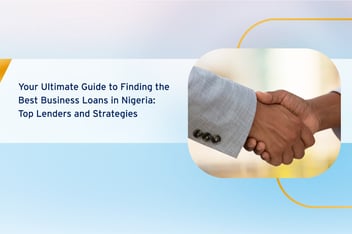
Top 8 Long-Term Business Loans in Nigeria, 2025
Author Taiwo Temitope-Adesope
Many small businesses in Nigeria face challenges accessing long-term business loans to expand their operations, launch new products, or invest in marketing and infrastructure.
Small businesses in Nigeria are the backbone of the economy, driving innovation, creating jobs, and fuelling growth. A long-term business loan is a type of financing that provides businesses with a large sum of money that is repaid over an extended period, typically longer than one year.
Unlike short-term loans, which are repaid within a year or less, long-term loans offer businesses a more extended repayment term, often ranging from 12 months to 25 years, depending on the lender and the specific terms of the loan.
Long-term business loans provide businesses with the capital they need to make substantial investments in their operations while spreading the repayment over an extended period, making it more manageable to repay the borrowed amount over time. Wondering which type of business loan is best suited for your business? Read this.
Some key features of long-term business loans include:
-
Large Loan Amounts
Long-term business loans offer higher loan amounts than short-term loans, allowing businesses to access the capital needed for large-scale projects or investments.
-
Extended Repayment Terms
Long-term loans come with longer repayment terms, giving businesses more time to repay the borrowed amount in fixed monthly installments over the loan term.
-
Fixed or Variable Interest Rates
Long-term business loans may have fixed or variable interest rates. Fixed-rate loans offer predictable monthly payments, as the interest rate remains constant throughout the loan term.
Variable-rate loans may have fluctuating interest rates based on market conditions, potentially leading to changes in monthly payments over time.
-
Collateral Requirements
Depending on the lender and the specific terms of the loan, long-term business loans may require collateral to secure the financing. Collateral can include business assets, such as real estate, equipment, inventory, or accounts receivable, which the lender can seize in the event of default.
-
Qualification Requirements
To qualify for a long-term business loan, businesses need to demonstrate a strong credit history, stable revenue, and the ability to repay the borrowed amount over the loan term.
Lenders may also consider factors such as the business industry, cash flow, profitability, and financial stability when evaluating loan applications.
Understanding the Different Types of Business Loans
When it comes to financing a small business in Nigeria, there is a wide array of loan options available, each designed to meet different needs and circumstances.
Here are some examples of the various types of business loans:
-
Term Loans
Term loans are one of the most common types of business financing. They involve borrowing a lump sum of money from a lender and repaying it over a set term, usually with fixed monthly payments. Term loans are often used for large purchases, such as equipment, real estate, or expansion projects.
-
SME Loans
Small and Medium Enterprise loans are a form of financing specifically designed to help small and medium-sized businesses get the capital they need to operate and grow.
SME loans can be used for a variety of business needs, such as working capital, equipment financing, business expansion, and financing the purchase or improvement of a commercial property among others.
-
Business Lines of Credit
A business line of credit is a revolving credit facility that allows businesses to borrow funds up to a predetermined credit limit. Unlike term loans, which provide a lump sum upfront, a line of credit gives businesses access to funds only when it is needed.
-
Equipment Loans
Equipment loans are specifically designed to finance the purchase of business equipment, machinery, or vehicles. The equipment serves as collateral for the loan, making it easier to qualify for financing. Equipment loans typically have fixed interest rates and terms that match the expected lifespan of the equipment being financed.
-
Invoice Financing
Invoice financing allows businesses to borrow money against outstanding invoices. Instead of waiting for customers to pay their invoices, businesses can access immediate cash flow by selling their unpaid invoices to a lender at a discount. Invoice financing can help businesses bridge gaps in cash flow and maintain steady operations.
Understanding the different types of business loans can help you choose the best financing option for your business's needs and goals.
Top 8 Long-Term Business Loans in Nigeria
Whether you're looking to purchase equipment, expand your operations, or manage cash flow, there's a business loan available to help you achieve your objectives.
Below are the top long-term lenders for small businesses in Nigeria:
*All lenders highlighted in this list are approved by the Central Bank of Nigeria. You can verify this here.
1. BOI-Bottom of the Pyramid Scheme
The Bottom of the Pyramid Scheme by the Nigerian Bank of Industry is an on-lending Scheme using the services of Microfinance Banks (MFBs) as a vehicle for credit delivery to the under-served and under-banked micro-entrepreneurs.
The Scheme is designed to leverage the spread and penetration of the MFBs in all parts of the country to stimulate economic activity within the critical mass at the bottom of the economic pyramid. The loan is offered with a three-year tenor and a moratorium of six months from the date of loan disbursement.
2. Letshego - Secured MSE Loan (MEGA)
The Secured MSE Loan (MEGA) by Letshego Microfinance Bank is for clients in any business, whether registered or not. This product is available for Local Purchase Order (LPO) financing trade and commerce green energy among others. The Letshego Secured MSE Loan attracts a maximum tenor of 36 months.
3. LAPO - SME Loan
With a 12-month duration, this SME loan by LAPO Microfinance Bank is a credit product designed specifically to support Small and Medium Scale Enterprises (SMEs) operators in Nigeria. The loan supports business owners with a credit facility of up to N5,000,000 to expand their enterprise.
4. NISL Credit - SME Loan
Streamline your business operations and seize growth opportunities with NISL Credit's SME Loan. Get the funding you need quickly and efficiently. Here's what makes it a great option. With NISL, you will receive your loan amount within 48 hours of applying, allowing you to capitalize on time-sensitive opportunities, and, the 12-month loan term helps with manageable repayments and faster access to working capital again.
5. Zitra Confam
Zitra Confam by Zitra Investment gives businesses quick, easy and flexible access to business loans tailored to their business requirements. With Zitra, business owners enjoy a enjoy a quick and easy application process. Also, the 12-month loan term provides manageable repayments to help bridge gaps in cash flow.6. Standard Chartered - Smart Business Loan
Smart Business Loan (SBL) by Standard Chartered Bank Nigeria provides businesses with access to loans of up to N20 million for expansion purposes.
The Smart Business Loan is structured to provide access to loans without collateral. The repayment plan can be structured to suit business needs and is flexible for up to two years.
7. Letshego Unsecured MSE Loan
The Letshego Retail Unsecured MSE Loan caters to established business owners with a minimum of six months in operation, specifically for those domiciled in Lagos, Ibadan, Calabar, or Abuja. This loan offers a repayment term of up to 24 months, allowing for manageable installments.
Overall, this Letshego loan option provides financing for business owners in select Nigerian cities with a longer repayment term. However, there might be further eligibility requirements to consider, you can read more about the Letshego Unsecured Loan on nairaCompare.
8. Union Bank - Term Loan
Union Bank's Term Loan caters specifically to the growth ambitions of Small and Medium Enterprises (SMEs). It functions as a long-term financing solution, providing SMEs with the capital they need to fuel business expansion. This loan is ideal for situations where an influx of funds is required to invest in equipment, renovate facilities, or venture into new markets.
However, it's important to note that securing a Term Loan involves pledging collateral, which acts as a form of security for the bank. The maximum loan term stretches up to 48 months, offering borrowers a beneficial extended timeframe to repay the loan amount comfortably.
Not sure which loan is best for you? We've got you! visit nairaCompare.ng to compare the interest rates, eligibility criteria, fees, and features of these loans side by side. Don't settle for less! Weigh the options and select the one that's best suited for your business.
Tips for Securing a Long-Term Business Loan
Securing a long-term business loan requires careful planning, preparation, and attention to detail.
The tips below can help you navigate the process and increase your chances of obtaining the financing your business needs.
Assess Your Financial Position: Evaluate your cash flow, revenue, profitability, and assets to determine your borrowing capacity and repayment ability.
Prepare a Detailed Business Plan: Lenders will want to see a comprehensive business plan that outlines your company's goals, strategies, financial projections, and repayment plan.
Check Your Credit Score: Review your credit reports from the major credit bureaus and take steps to improve your credit score if necessary, such as paying down debt and resolving any outstanding issues.
Gather Required Documentation: Be prepared to provide financial documents and business records when applying for a long-term loan. This may include financial statements, tax returns, bank statements, business licenses, and legal documents.
Consider Collateral Options: If you don’t qualify for an unsecured long-term loan, consider offering collateral to secure the financing.
Be Honest and Transparent: Lenders appreciate transparency and are more likely to work with businesses that demonstrate integrity and trustworthiness.
Seek Professional Advice: Consider seeking guidance from financial advisors, accountants, or business consultants who can help you navigate the loan application process, review loan terms, and provide valuable insights into your business's financial strategy.
By following these tips and approaching the loan application process strategically, you can improve your chances of securing a long-term business loan that meets your needs and supports your business's growth and success.
Conclusion
Long-term business loans can be a powerful tool for propelling your Nigerian business forward. By carefully assessing your needs, researching lenders, and crafting a strong loan application, you can secure the financing required to invest in growth, navigate challenges, and achieve your entrepreneurial goals.
Remember to choose the right loan option for your unique situation. With a strategic approach and a solid financial plan, a long-term business loan can be the key to unlocking your business's full potential.
Ready to find the right business loan for you? Click the button below!
About Author

Taiwo Temitope-Adesope
Taiwo is a passionate storyteller and strategist dedicated to empowering women and crafting compelling narratives. A First-Class graduate in Mass Communication from Covenant University, she specializes in writing, public relations, and digital marketing. As a Content Manager at Suretree, she drove a 50% increase in web traffic through SEO and boosted website engagement by 60% in just four months. Her leadership experience includes serving as Public Relations Officer for the Covenant University Student Council and contributing to impactful volunteer initiatives. With expertise in strategic thinking and business acumen, Taiwo continues to create stories that inspire confidence and imagination.
.png?width=1615&height=444&name=nairaCompare%20Christmas%20Full%20Logo%20(White%20%26%20Yellow).png)
.png?width=1615&height=444&name=nairaCompare%20Christmas%20logo%20(PNG).png)


%20(31).png?width=600&height=200&name=Copy%20of%20Introducing%20the%20Money%20in%20Minutes%20Business%20Loan%20(Email%20Header)%20(31).png)






